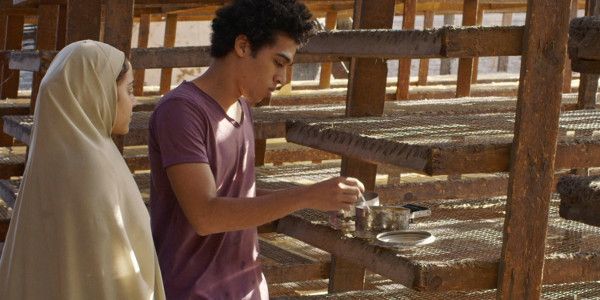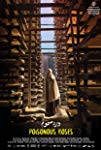Eye For Film >> Movies >> Poisonous Roses (2018) Film Review
Poisonous Roses
Reviewed by: Amber Wilkinson

Water, so often a symbol of cleansing and renewal in films, takes on a much darker character in Fawzi Saleh's debut feature. Here, it is a murky and malodorous river, running through the back streets of Cairo, constantly added to by the effluent pouring out of the tanneries and glue factories that line its route. The cramped streets and alleyways - some barely more than the shoulder's width apart of the film's protagonist Taheya (Koky) - only add to the sense of intense claustrophobia.
Taheya, a toilet attendant, lives in the middle of the district with her brother Saqr (Ibrahim El-Nagary), who works in the tannery, and mother (Safaa El-Toukhy). There's no faulting the atmosphere Saleh creates, if the sight of people picking their way around the river of sludge weren't enough, the toxic nature of the area is underlined by workers falling ill and a man turning a white horse grey as he 'washes' it. Saleh, whose previous film Living Skin documented the deadliness of the tanneries, and his cinematographer Maged Nader, fill the film with striking images, not just in the tanneries but of men working in the equally gruelling environment of the glue factory, fishing out gelatinous cubes of it before filling towering stacks with the end product.

The plot is a different matter. Taheya dotes on Saqr to the point of oddness, taking him lunch each day despite his indifference and showing such an interest that initially you might be forgiven for thinking they were man and wife. While the novel on which the film is loosely based - Zaghloul Al-sheety’s Poisonous Roses For Saqr - evokes the Egyptian goddess Isis, who wed her own brother, there's no real sense of the allegory coming though in the film as the characters lack depth.
Taheya is reduced to little more than the human embodiment of obsessiveness and Saqr never fully takes shape as a character. We're told that he wants to try the illegal journey to Italy in search of a better life but we don't see enough of him outside of his stilted interactions with Taheya to feel any emotional connection to that desire. A mysterious magician (Mahmood Hemaidah), though initially seeming to offer up the possibility of the idea of belief systems in conflict, also drifts with little consequence in and out of the story. There are hints of social commentary that might have been, most notably in the workplace chat between the other cleaners, who talk about the influence of preachers on the men in their lives, but Saleh never develops them into more than asides, returning instead to the less satisfactory broad brush sweeps of the main narrative. As a document of the tannery area, the film has much to say but the fictional story pales in comparison.
Reviewed on: 03 Jan 2019















